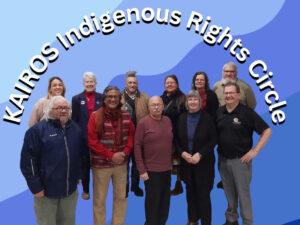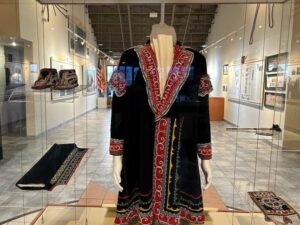Human Rights Tribunal ruling a win for Indigenous children & reconciliation

(Toronto, ON) – KAIROS Canada urges the Canadian government to act immediately to implement the landmark ruling of the Canadian Human Rights Tribunal, which today announced that the federal government has discriminated against 163,000 children and their families because they are Indigenous.
In February 2007, the First Nations Child and Family Caring Society (Caring Society) and the Assembly of First Nations (AFN) filed a complaint with the Tribunal alleging that the Department of Indian and Northern Affairs provision of First Nations child and family services was flawed, inequitable and thus discriminatory under the Canadian Human Rights Act.
In its ruling, the Tribunal said that it “acknowledges the suffering of those First Nations children and families who are or have been denied an equitable opportunity to remain together or be reunited in a timely manner. We also recognize those First Nations children and families who are or have been adversely impacted by the Government of Canada’s past and current child welfare practices on reserve.”
The Tribunal orders Ottawa to “cease its discriminatory practices and reform the FNCFS [First Nations Child and Family Services] Program and the 1965 [Ontario] Agreement to reflect the findings of this decision.”
KAIROS Canada has supported the plaintiffs in a number of ways, including through the Caring Society’s I am a witness campaign, which invites organizations and people of all ages to follow and learn about the case and to decide for themselves if First Nations children are being treated fairly.
In October 2014, KAIROS hosted a Solidarity Evening for the Caring Society on the eve of final arguments before the Canadian Human Rights Tribunal. KAIROS subsequently produced 22 vignettes that featured some of that evening’s speakers.
“This is a great day for Canada and its journey of reconciliation,” says Jennifer Henry, KAIROS’ Executive Director. “Lack of family support services, which leads to unnecessary removals of Indigenous children from their families, as cited by the Caring Society, is a legacy of the Indian Residential Schools. We urge the government of Canada to adopt the Truth and Reconciliation Commission’s (TRC) calls to action in its efforts to provide equitable services and support for young Indigenous people and their families.”
Of the TRC’s 94 Calls to Action, which were released on June 2, the first 12 are devoted to recommended improvements in Indigenous child welfare and education.
About KAIROS: Canadian Ecumenical Justice Initiatives
KAIROS is a faith-based social justice organization of eleven Canadian churches and religious organizations. It focuses on Indigenous rights, human rights and ecological justice. We deliberate on issues of common concern, advocate for social change and join with people of faith and goodwill in action for social transformation. To learn more, visit kairoscanada.org.
– 30 –
Media Contact:
Ed Bianchi, Program Manager, 613-235-9956 x 221, ebianchi@kairoscanada.org
Cheryl McNamara, Media Coordinator, 877-403-8933 x 246, cmcnamara@kairoscanada.org
BACKGROUND*
Allegation before the Canadian Human Rights Tribunal
In February of 2007 the First Nations Child and Family Caring Society (Caring Society) and the Assembly of First Nations (AFN) filed a complaint alleging that the Department of Indian and Northern Affairs provision of First Nations child and family services was flawed, inequitable and thus discriminatory under the Canadian Human Rights Act.
The Canadian Human Rights Tribunal (www.chrt-tcdp.gc.ca)
The Tribunal adjudicates complaints filed under the Canadian Human Rights Act. The Tribunal has the authority to make a legal determination of discrimination and order remedies.
Parties to the Proceeding
Complainants: First Nations Child and Family Caring Society & Assembly of First Nations
Commission: Canadian Human Rights Commission (representing the public interest)
Interested Parties: Chiefs of Ontario & Amnesty International
Respondent: Attorney General of Canada (representing the Minister of Indian and Northern Affairs)
Case History
Indian and Northern Affairs Canada (INAC) requires First Nations child and family service agencies to operate pursuant to provincial/territorial child welfare laws. The federal government controls the nature and extent of child welfare delivery on reserve through a variety of policies, programs and funding regimes. Internal INAC reviews and Auditor General of Canada reports (2008, 2011) have repeatedly found INAC’s flawed and inequitable approaches contribute to growing numbers of First Nations children in child welfare care. The complaint was filed in 2007 in the best interests of First Nations children after INAC failed to implement two solutions it jointly developed with First Nations.
The Federal Government Response to the Case
The Federal Government spent over 3 million dollars in its unsuccessful efforts to get the case dismissed on technical grounds before the facts could be heard arguing that child welfare services delivered to First Nations should not be compared to those delivered to all other Canadians (known as the comparator argument) and that funding is not a service pursuant to the Canadian Human Rights Act (known as the service argument).
Hearing Evidence
The Tribunal began hearing the evidence on February 25, 2013 and heard from 25 witnesses (18 for the Commission and the complainants and 7 for the Attorney General). The last witness testified on May 30, 2014 and approximately 500 documents were filed as evidence. This case will set an important precedent for addressing inequitable Federal Government service delivery to First Nations peoples in other areas such as education, health, housing, and water.
More information
For more information visit www.fnwitness.ca or email: info@fncaringsociety.com
* Courtesy of the First Nations Child and Family Caring Society







